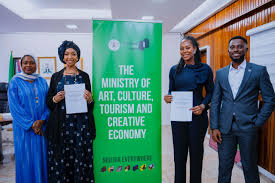The Federal Ministry of Arts, Culture, Tourism, and Creative Economy (FMACTCE), in collaboration with the Institute for Tourism Professionals of Nigeria (ITPN), has convened stakeholders to chart a sustainable pathway for leveraging Nigeria’s coastal resources and marine biodiversity to boost tourism and economic growth. The one-day seminar, themed “Development of National Blue Economy and Coastal Biodiversity in Tourism,” held at the Shehu Musa Yar’Adua Centre in Abuja, brought together policymakers, industry leaders, and coastal community representatives to address gaps in maritime tourism infrastructure, policy frameworks, and ecosystem conservation.
Key Focus Areas and Stakeholder Inputs
The event emphasized Nigeria’s vast potential in maritime tourism, which includes cruising, yachting, nautical sports, and eco-tourism, anchored on its 850-kilometre Atlantic coastline and vibrant coastal communities. ITPN President Mr. Abiodun Odusanwo highlighted the urgent need for modern ports, coastal roads, and waste management systems to support tourism activities while preserving marine ecosystems. He stressed that inconsistent policies, climate change impacts, and unregulated resource exploitation remain critical barriers to growth.
Minister’s Vision for Sustainable Marine Tourism
Hannatu Musawa, Minister of Art, Culture, Tourism, and Creative Economy, outlined plans to position Nigeria as Africa’s leading eco-tourism destination by integrating marine tourism into the national blue economy framework. Represented by Mr. Sunday Mkpejie Bisong, she emphasized the economic potential of sustainable tourism in generating jobs, attracting investments, and showcasing Nigeria’s cultural heritage. The minister called for a balance between economic growth and environmental stewardship, noting the degradation of mangroves, coral reefs, and beaches due to pollution and overfishing.
Multi-Sector Collaboration and Community Engagement
Stakeholders advocated stronger partnerships between government agencies, private investors, and local communities to unlock the sector’s value. NIMASA’s Assistant Director, Mr. Abari Ahmed, underscored the role of coastal youth in policy formulation, while NIHOTOUR Director General Dr. Abisoye Fagade emphasized public-private synergy to drive innovation. Mrs. Ugochi Akudo-Nwosu, representing the ministry’s Permanent Secretary, reiterated the need to preserve coastal biodiversity as a foundation for cultural identity and eco-tourism.
Policy and Infrastructure Priorities
The seminar concluded with calls for urgent government action to finalize the National Policy on Culture—currently under review after 37 years—and align it with blue economy objectives. Participants urged increased funding for coastal infrastructure, stricter regulations against marine pollution, and capacity-building programs for tourism operators. The collaboration between FMACTCE and ITPN marks a critical step toward harmonizing Nigeria’s maritime tourism strategies with global best practices, ensuring inclusive growth for coastal communities.
Next Steps
The ministry plans to integrate outcomes from the seminar into its ongoing review of the National Cultural Policy, working with UNESCO and the Nigerian Economic Summit Group (NESG) to ensure coherence with sustainable development goals. With the blue economy projected to contribute significantly to Nigeria’s GDP, the event sets the stage for actionable partnerships to transform coastal regions into hubs of eco-friendly tourism and cultural exchange.
